Unit 1 重点单词及句型总结
一年级上册英语素材 Unit1-Unit6 单元重点词汇与句型归纳总结 人教新起点版
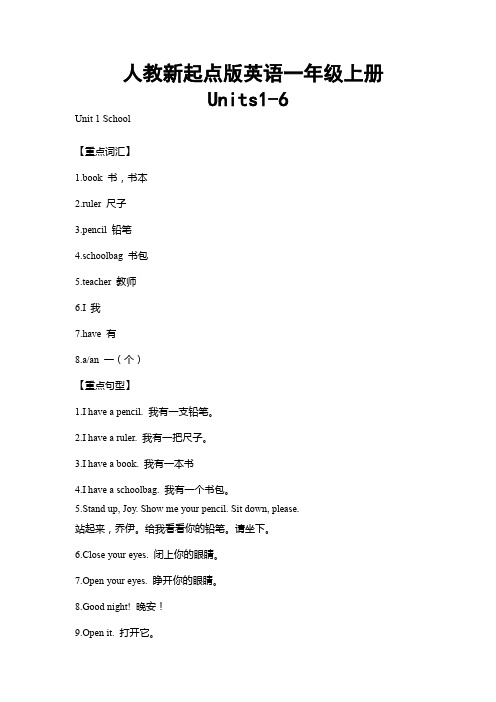
人教新起点版英语一年级上册Units1-6Unit 1 School【重点词汇】1.book 书,书本2.ruler 尺子3.pencil 铅笔4.schoolbag 书包5.teacher 教师6.I 我7.have 有8.a/an 一(个)【重点句型】1.I have a pencil. 我有一支铅笔。
2.I have a ruler. 我有一把尺子。
3.I have a book. 我有一本书4.I have a schoolbag. 我有一个书包。
5.Stand up, Joy. Show me your pencil. Sit down, please.站起来,乔伊。
给我看看你的铅笔。
请坐下。
6.Close your eyes. 闭上你的眼睛。
7.Open your eyes. 睁开你的眼睛。
8.Good night! 晚安!9.Open it. 打开它。
10.Show me your schoolbag. 给我看看你的书包。
11.Show me your ruler. 给我看看你的尺子。
Unit 2 Face【重点词汇】1.face 脸2.ear 耳朵3.eye 眼睛4.nose 鼻子5.mouth 嘴巴6.this 这(个)7.is 是8.my 我的【重点句型】1.Touch your mouth. 摸你的嘴巴。
2.This is my mouth. 这是我的嘴巴。
3.Touch your nose. 摸你的鼻子。
4.This is my nose. 这是我的鼻子。
5.Look at my eye. 看我的眼睛。
6.Look at my ear. 看我的耳朵。
7.Look at my nose. 看我的鼻子。
8.Look at my mouth. 看我的嘴巴。
9.I have two ears. 我有两只耳朵。
10.I have two eyes. 我有两只眼睛。
11.I have no tail. 我没有尾巴。
Unit 1 重点单词及句型总结
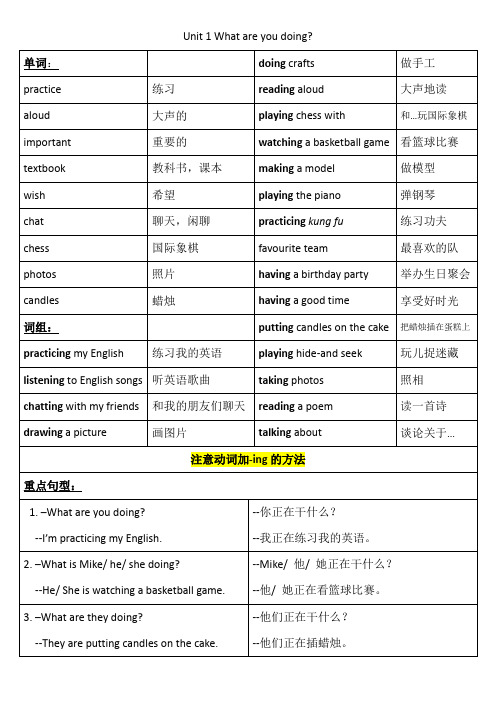
做模型
wish
希望
playingthe piano
弹钢琴
chat
聊天,闲聊
practicingkung fu
练习功夫
chess
国际象棋
favourite team
最喜欢的队
photos
照片
havinga birthday party
举办生日聚会
candles
蜡烛
havinga good time
和我的朋友们聊天
readinga poem
读一首诗
drawinga picture画图片来自talkingabout
谈论关于…
注意动词加-ing的方法
重点句型:
1.–What are you doing?
--I’m practicing my English.
--你正在干什么?
--我正在练习我的英语。
2.–What is Mike/ he/ she doing?
Unit1What are you doing?
单词:
doingcrafts
做手工
practice
练习
readingaloud
大声地读
aloud
大声的
playingchess with
和…玩国际象棋
important
重要的
watchinga basketball game
看篮球比赛
textbook
教科书,课本
享受好时光
词组:
puttingcandles on the cake
把蜡烛插在蛋糕上
practicingmy English
Unit 1 Topic 1 重难点知识归纳总结2021-2022学年仁爱版英语七年级上册

Unit 1 Making new friendsTopic 1 Welcome to China!【重点单词】1.good [ɡud] adj. 好的;令人愉快的2.morning [ˈmɔ:niŋ] n. 早晨;上午3.I [ai] pron. 我4.am [æm] v. 是5.welcome [ˈwɛlkəm] interj. & v. 欢迎6.to /tə;tu/ prep. 到,对,向;在……之前(动词不定式符号,无词义)7.China [ˈtʃaɪnə] n. 中国8.thank [θæŋk] v. 谢谢,感谢9.you [ju] pron. 你;您;你们10.the [ðə; ði] art. 这(那)个,这(那)些11.the USA [ˌjuː es ˈeɪ] = the United States of America 美国;美利坚合众国12.the UK [ˌjuː ˈkeɪ] = the United Kingdom 英国,联合王国(包括大不列颠及北爱尔兰)13.hello [heˈləu] interj. 喂,你好14.are [ɑ:] v. 是15.yes [jes] adv. 是,同意16.no [nəu] interj. 不;不是det. 没有,无17.not [nɔt] adv. 不;没有18.oh [əʊ] interj. 哦;啊19.nice [nais] adj. 令人愉快的;友好的20.meet [mi:t] v. 结识;遇见21.too [tu:] adv. 也;太;很22.hi [hai] interj. 喂23.thanks [θæŋks] interj. & n. 感谢;谢谢24.Mr. =mister /ˈmɪstər/ n. 先生25.see [si:] v. 遇见;看到;明白26.mom [mɔm] (mum [mʌm] BrE)n. 妈妈27.this [ðɪs ] pron. & det. 这,这个28.is [ɪz] v. 是29.my [maɪ] det. 我的30.teacher [ˈti:tʃə] n. 老师,教师31.how [hau] adv. 怎样;多少;多么32.do [du] v. aux. 构成否定句、疑问句的助动词,无词义v. 做33.dad [dæd] n. 爸爸34.Miss [mis] n. 女士;小姐35.Ms. /miz/ n. 女士36.afternoon [ˌɑ:ftəˈnu:n] n. 下午37.goodbye [ˌɡudˈbai] interj. 再见38.bye [baɪ] interj. 再见39.fine [fain] adj. 健康的;晴朗的40.and [ænd, ənd] conj. 和41.OK /əʊ'keɪ/ adj. (口语)安然无恙interj. 好,行42.here /hɪr/ adv. 在这里【重点短语】1.Good morning. 早上好2.Welcome to... 欢迎来到……3.Thank you. 谢谢。
七上unit1知识点总结

七上unit1知识点总结一、重点短语:1、after school 放学后2、over there 在那边3、how to do sth 怎样去做某事4、look after 照顾5、at Sunshine Middle School 在阳光中学6、Nice/Glade to meet you 很高兴见到你7、I see 我看见了,我明白了8、wear glasses 戴着眼镜二、重要用法总结:1、in Class 1, Grade 7= in Class One, Grade Seven 在七年级一班2、be good at doing sth 擅长做某事3、c ome from…=be from… 来自…4、glass “玻璃“是不可数名词“玻璃杯“是可数名词“眼镜“只有复数形式—glasses5、let’s = let us 后接动原三、重点语法:一般现在时态:1、时态标志词:6+16个频度副词:always、usually、often、sometimes、seldom、never +1个every 2、动词形式:主语三单,动词三单。
主语非三单,动词用原形。
(Do/Does/don’t/doesn’t/情态动词后用动原)3、句型结构:(be动词句型/实义动词句型)Be动词句型:肯定句:主语+be+其它。
否定句:主语+be not+其它。
一般疑问句:Be+主语+其它?实义动词句型:肯定句:主语(三单)+ 动词三单+其它。
主语(非三单)+ 动词原形+其它。
否定句:主语(三单)+doesn’t+动词原形+其它。
主语(非三单)+don’t+动词原形+其它。
一般疑问句:Does+主语(三单)+动词原形+其它?Do+主语(非三单)+动词原形+其它?。
PEP人教版英语六上Unit 1 单元单词短语句型知识点总结

1.用句型“How can I/we get to +(the)地点名词?”来询问如何到达某地。其中“How”用来询问事情的方式,位于句首,引导特殊疑问句。
如:How can I get to the park?我怎么才能到达公园?
2.询问地点的固定句型为:Where+ be动词+地点/处所?答语通常为:It’s/They’re+地点。在口语中也可以直接用表示地点的介词短语来回答。如:
Unit 1 How can I get there?
ቤተ መጻሕፍቲ ባይዱ单词
science科学museum博物馆bookstore书店
cinema电影院hospital医院crossing十字路口
turn转弯left左straight笔直地
right右
短语
post office邮局get to到达turn left左转
turn right右转next to靠近go straight直走
in front of在……前面over there在那儿
pass by经过far from离……远
句子
1. —Where is the science museum?科学博物馆在哪儿?
—It’s near the library.它在图书馆附近。
2. —How can I get there?我怎么到那儿?
—Turn right at the school. Then go straight.在学校右转。然后直走。
3. I want to buy a postcard.我想买一张明信片。
4. There is a pet hospital in my city.在我的城市里有一家宠物医院。
unit_1_how_can_we_become_good_learners_重点短语和句型总结
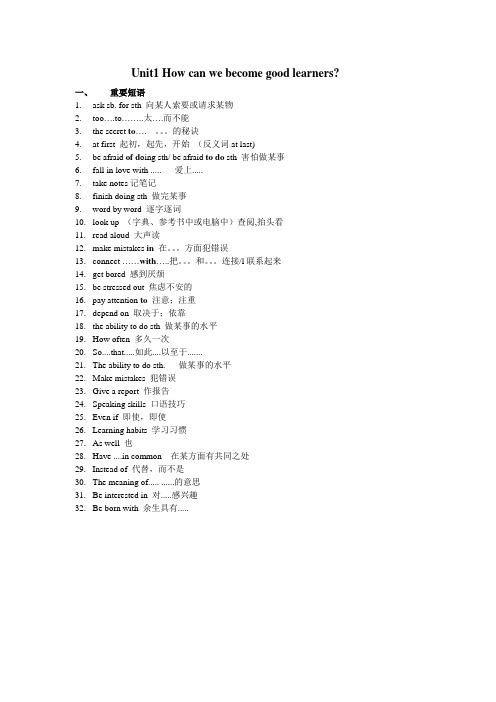
Unit1 How can we become good learners?一、重要短语1.ask sb. for sth 向某人索要或请求某物2.too….to……..太….而不能3.the secret to…. 。
的秘诀4.at first 起初,起先,开始(反义词at last)5.be afraid of d oing sth/ be afraid to do sth 害怕做某事6.fall in love with ..... 爱上.....7.take notes记笔记8.finish doing sth 做完某事9.word by word 逐字逐词10.look up (字典、参考书中或电脑中)查阅,抬头看11.read aloud 大声读12.make mistakes in 在。
方面犯错误13.connect ……with…..把。
和。
连接/l联系起来14.get bored 感到厌烦15.be stressed out 焦虑不安的16.pay attention to 注意;注重17.depend on 取决于;依靠18.the ability to do sth 做某事的水平19.How often 多久一次20.So....that.....如此....以至于.......21.The ability to do sth. 做某事的水平22.Make mistakes 犯错误23.Give a report 作报告24.Speaking skills 口语技巧25.Even if 即使,即使26.Learning habits 学习习惯27.As well 也28.Have ....in common 在某方面有共同之处29.Instead of 代替,而不是30.The meaning of..... ......的意思31.Be interested in 对.....感兴趣32.Be born with 余生具有.....重点句型1.The more you read, the faster you’ll be.The +比较级.......,the +比较级....... 越。
unit1知识点

unit1知识点
以下是Unit 1的知识点:
1. 问候和自我介绍:
- 问候的常用表达:Hello, hi, good morning/afternoon/evening, how are you?
- 自我介绍的常用句型:My name is xxx. I am xx years old. I come from xxx.
2. 介绍家庭成员:
- 家庭成员的称呼:father, mother, brother, sister, grandparents, etc.
- 介绍家庭成员的常用句型:This is my father/mother/brother/sister. His/Her name is xxx.
3. 询问和回答个人信息:
- 询问名字:What's your name?/What's your full name?
- 询问年龄:How old are you?
- 询问国籍:Where are you from?
- 回答个人信息的常用句型:My name is xxx. I am xx years old. I come from xxx.
4. 简单的日常用语:
- 感谢:Thank you. Thanks a lot.
- 道歉:I'm sorry. I apologize.
- 请问:Excuse me, can I ask you a question?
5. 时态:
- 一般现在时:表述经常发生的事情、事实和真理。
- 现在进行时:表示现在正在进行或发生的动作。
这些是Unit 1的主要知识点,希望对你有帮助!。
人教版高中英语必修一 Unit1 重难点知识归纳总结
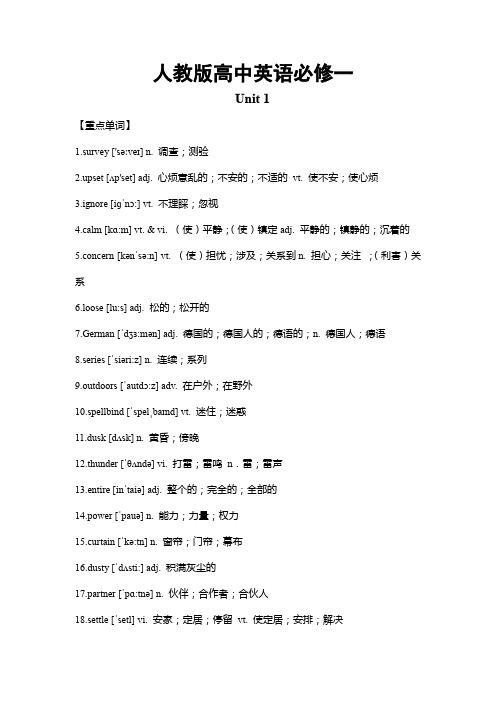
人教版高中英语必修一Unit 1【重点单词】1.survey ['səːveɪ] n. 调查;测验2.upset [ʌp'set] adj. 心烦意乱的;不安的;不适的vt. 使不安;使心烦3.ignore [iɡˈnɔ:] vt. 不理睬;忽视4.calm [kɑ:m] vt. & vi. (使)平静;(使)镇定adj. 平静的;镇静的;沉着的5.concern [kənˈsə:n] vt. (使)担忧;涉及;关系到n. 担心;关注;(利害)关系6.loose [lu:s] adj. 松的;松开的7.German [ˈdʒɜ:mən] adj. 德国的;德国人的;德语的;n. 德国人;德语8.series [ˈsiəri:z] n. 连续;系列9.outdoors [ˈautdɔ:z] adv. 在户外;在野外10.spellbind [ˈspelˌbaɪnd] vt. 迷住;迷惑11.dusk [dʌsk] n. 黄昏;傍晚12.thunder [ˈθʌndə] vi. 打雷;雷鸣n.雷;雷声13.entire [inˈtaiə] adj. 整个的;完全的;全部的14.power [ˈpauə] n. 能力;力量;权力15.curtain [ˈkə:tn] n. 窗帘;门帘;幕布16.dusty [ˈdʌsti:] adj. 积满灰尘的17.partner [ˈpɑ:tnə] n. 伙伴;合作者;合伙人18.settle [ˈsetl] vi. 安家;定居;停留vt. 使定居;安排;解决19.suffer [ ˈsʌfə] vt. & vi. 遭受;忍受;经历20.loneliness [ˈləʊnlɪnɪs] n. 孤单;寂寞21.recover [riˈkʌvə] vi. & vt. 痊愈;恢复;重新获得22.pack [pæk] vi. & vt. 捆扎;包装;打包行李n. 小包;包裹23.suitcase [ˈsju:tkeis] n. 手提箱;衣箱24.teenager [ˈti:neidʒə] n. 十几岁的青少年25.gossip [ˈɡɔsip] vi. & n. 闲话;闲谈26.exactly [ɪg'zæk(t)lɪ] adv. 确实如此;正是;确切地27.disagree [dɪsə'griː] vi. 不同意28.grateful [ˈɡreitful] adj. 感激的;表示谢意的29.dislike [dɪs'laɪk] n. & vt. 不喜欢;厌恶30.tip [tɪp] n. 提示;技巧;尖;尖端;小费vt. 倾斜;翻倒31.secondly ['sek(ə)ndlɪ] adv. 第二;其次32.swap [swɔp] vt. 交换33.item [ˈaitəm] n. 项目;条款【重点短语】1.be good to 对……友好2.add up 合计3.get sth done 使某物被做4.calm down 镇定下来5.have got to 不得不6.be concerned about 关心;挂念7.make a list of 列出8.share sth with sb 和某人分享某物9.go through 经历;仔细检查10.hide away 躲藏;隐藏11.set down 放下;记下12.a series of 一系列;一套13.be crazy about 对……着迷14.on purpose 故意15.in order to/ so as to 为了16.face to face 面对面地17.according to 按照;根据……所说18.get along with 与……相处19.pack up 收拾,打理行装20.have trouble with sb/sth 同某人闹意见;做某事有困难21.fall in love 相爱22.try out 试验;试用23.join in 参加(活动)municate with sb 和某人交流25.look to sth 注意/留心某事26.cheat sb (out) of sth 骗取某人某物27.have the/a habit of doing ... 有做……的习惯28.be ignorant of 无知的;不知道【重点句型】1. It was the first time in a year and a half that I had seen the night face to face. (从句时态用完成时)这是我一年半以来第一次目睹夜晚。
三年级上册英语Unit 1 知识总结
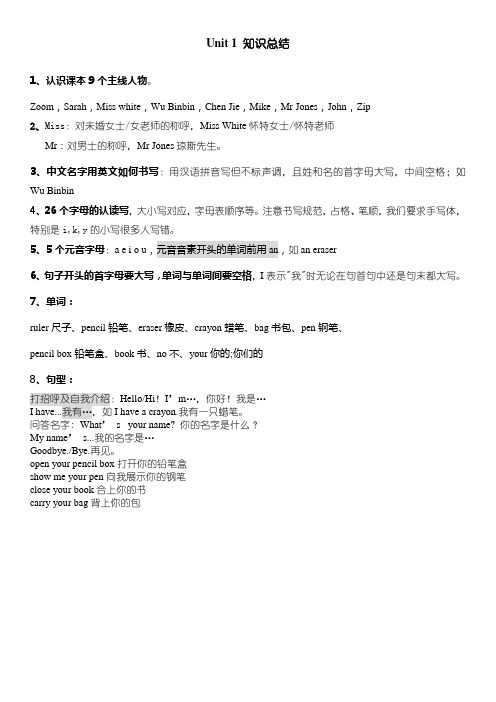
Unit 1 知识总结
1、认识课本9个主线人物。
Zoom,Sarah,Miss white,Wu Binbin,Chen Jie,Mike,Mr Jones,John,Zip
2、Miss:对未婚女士/女老师的称呼,Miss White怀特女士/怀特老师
Mr:对男士的称呼,Mr Jones琼斯先生。
3、中文名字用英文如何书写:用汉语拼音写但不标声调,且姓和名的首字母大写,中间空格;如Wu Binbin
4、26个字母的认读写,大小写对应,字母表顺序等。
注意书写规范,占格、笔顺,我们要求手写体,特别是i,k,y的小写很多人写错。
5、5个元音字母:a e i o u,元音音素开头的单词前用an,如an eraser
6、句子开头的首字母要大写,单词与单词间要空格,I表示"我"时无论在句首句中还是句末都大写。
7、单词:
ruler尺子、pencil铅笔、eraser橡皮、crayon蜡笔、bag书包、pen钢笔、
pencil box铅笔盒、book书、no不、your你的;你们的
8、句型:
打招呼及自我介绍:Hello/Hi!I’m…,你好!我是…
I have...我有…,如I have a crayon.我有一只蜡笔。
问答名字: What’s your name?你的名字是什么?
My name’s...我的名字是…
Goodbye./Bye.再见。
open your pencil box打开你的铅笔盒
show me your pen向我展示你的钢笔
close your book合上你的书
carry your bag背上你的包。
PEP五年级上册英语Unit1知识点总结
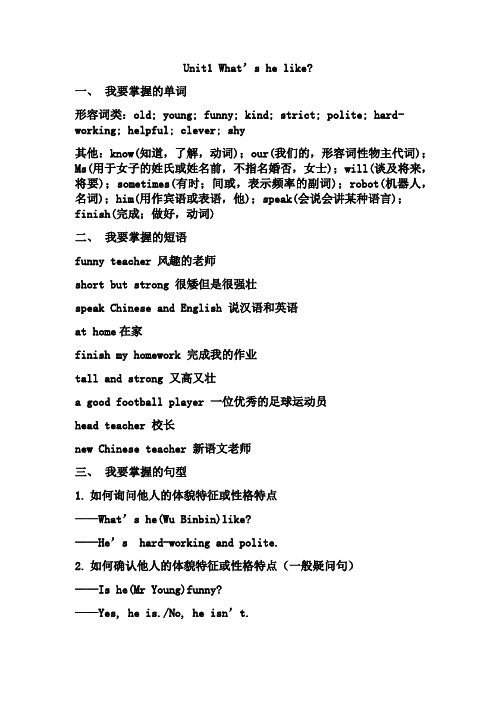
Unit1 What’s he like?一、我要掌握的单词形容词类:old; young; funny; kind; strict; polite; hard-working; helpful; clever; shy其他:know(知道,了解,动词);our(我们的,形容词性物主代词);Ms(用于女子的姓氏或姓名前,不指名婚否,女士);will(谈及将来,将要);sometimes(有时;间或,表示频率的副词);robot(机器人,名词);him(用作宾语或表语,他);speak(会说会讲某种语言);finish(完成;做好,动词)二、我要掌握的短语funny teacher 风趣的老师short but strong 很矮但是很强壮speak Chinese and English 说汉语和英语at home在家finish my homework 完成我的作业tall and strong 又高又壮a good football player 一位优秀的足球运动员head teacher 校长new Chinese teacher 新语文老师三、我要掌握的句型1.如何询问他人的体貌特征或性格特点——What’s he(Wu Binbin)like?——He’s hard-working and polite.2.如何确认他人的体貌特征或性格特点(一般疑问句)——Is he(Mr Young)funny?——Yes, he is./No, he isn’t.3.如何询问对方某一学科的老师是谁——Who’s your art teacher?——Mr Jones.四、我要掌握四个词Mr:用在男子的姓氏或姓名前 Mr MaMiss:用在没有结婚的女子的姓氏或姓名前 Miss WhiteMs: 用于不指名婚否的女子的姓氏或姓名前 Ms WangMrs: 用于已婚的女子的姓氏或姓名前 Mrs Smiths五、我要掌握的发音-y /i/ baby happy windy sunny sorry candy many family party特别注意:-y位于单词末尾时,不一定都发/i/,如:my shysky六、我要掌握的其他知识点1.Ms Wang will be our new Chinese teacher.(will+动词原型)2.My grandpa made him.(made是make的过去式;him是人称代词的宾格)3.He makes me finish my homework.(makes是make的三单形式;me是人称代词的宾格)七、我要会写作文(范文)My friendI have a good friend. His name is xxx. He is 11 years old. He is tall and strong. He has blue glasses. He is helpful and polite. He is friendly, too. We are good friends.My teacherI have a new Chinese teacher. She is Mrs Wang. She is tall and thin. She has long hair. She is young. She is very kind. But sometimes she is strict. I like her very much.。
Unit-1-Can-you-come-to-my-party知识点归纳
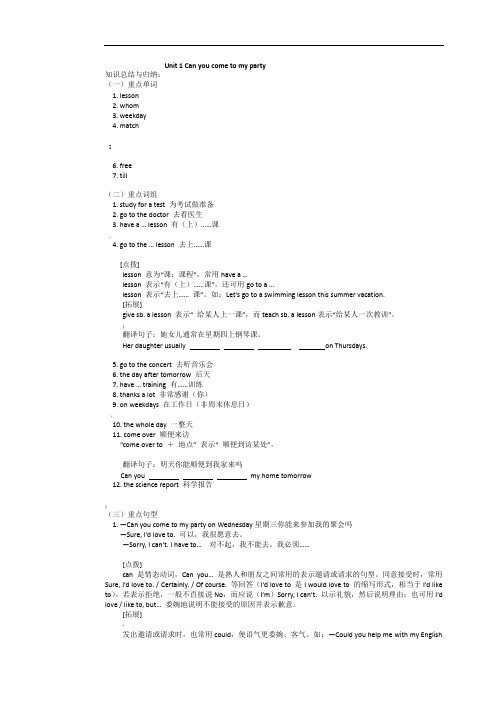
Unit 1 Can you come to my party知识总结与归纳:(一)重点单词1. lesson2. whom3. weekday4. match$6. free7. till(二)重点词组1. study for a test 为考试做准备2. go to the doctor 去看医生3. have a … lesson 有(上)……课,4. go to the … lesson 去上……课[点拨]lesson 意为“课;课程”,常用have a …lesson 表示“有(上)……课”,还可用go to a …lesson 表示“去上…… 课”。
如:Let’s go to a swimming lesson this summer vacation.[拓展]give sb. a lesson 表示“ 给某人上一课”,而teach sb. a lesson表示“给某人一次教训”。
}翻译句子:她女儿通常在星期四上钢琴课。
Her daughter usually on Thursdays.5. go to the concert 去听音乐会6. the day after tomorrow 后天7. have … training 有……训练8. thanks a lot 非常感谢(你)9. on weekdays 在工作日(非周末休息日)(10. the whole day 一整天11. come over 顺便来访“come over to +地点” 表示“ 顺便到访某处”。
翻译句子:明天你能顺便到我家来吗Can you my home tomorrow12. the science report 科学报告|(三)重点句型1. —Can you come to my party on Wednesday星期三你能来参加我的聚会吗—Sure, I’d love to. 可以,我很愿意去。
八年级上册英语unit1知识点整理

八年级上册英语unit1知识点整理01Unit1单词anyone /'eniw?n/ pron.任何人anywhere /'eniwe?(r)/ adv.任何地方wonderful /'w?nd?fl/ adj.精彩的;绝妙的few/ fju:/adj.&pron.不多;很少quite a few相当多;不少(后接可数名词)most /m??st/ adj.,adv.&pron.最多;大多数something /'s?mθ??/ pron.某事;某物nothing (=not…anything) /'n?θ??/ pron.没有什么;没有一件东西everyone /'evriw?n/ pron.每人;人人;所有人of course /?vk?:s/ 当然;自然myself /ma?'self/ pron.我自己;我本人yourself /j?:'self/ pron.你自己;您自己hen /hen/ n.母鸡pig /p?g/n.猪seem /si:m/ vi.好像;似乎;看来bored /b?:d/ adj.厌倦的;烦闷的someone /'s?mw?n/ pron.某人diary /'da??ri/ n.日记;日记簿(keep a diary)activity /?k't?v?ti/ n.活动decide /d?'sa?d/ v.决定;选定(decide to do sth.)try /tra?/ v.尝试;设法;努力 (try to do sth. /try doing sth.)paragliding /'p?r?ɡla?d??/ n.空中滑翔跳伞feel like 给……的感觉;感受到bird /b?:d/ n.鸟bicycle /'ba?s?kl/ n.自行车;脚踏车building /'b?ld??/ n.建筑物;房子trader /'tre?d?(r)/ n.商人wonder /'w?nd?(r)/ v.想知道;琢磨difference /'d?fr?ns/ n.差别;差异top /t?p/ n.顶部;表面wait /we?t/ v.等待;等候(wait for)umbrella /?m'brel?/ n.伞;雨伞wet /wet/ adj.湿的;雨天的because of因为below /b?'l??/ prep.&adv.在……下面;到……下面enough /?'n?f/ adj.足够的(地)adv.充足的(地);充分的(地) hungry /'h??ɡri/ adj.饥饿的as /?z/ conj.像……一样;如同hill /h?l/ n.小山;山丘duck /d?k/ n.鸭dislike /d?s'la?k/v.&n.不喜爱(的事物);厌恶(的事物) Central Park 中央公园(美国纽约) HuangguoshuWarterfall /'w?:t?(r)f?:l/ 黄果树瀑布(贵州)HongKong /,h??'k??/,/'ha:?,ka:?/香港(中华人民共和国特别行政区)Malaysia /m?'le/马来西亚;Malaysian /m?'le??n/adj.马来西亚的;n.马来西亚人; Georgetown /?d??:d?ta?n/乔治市(马来西亚)Weld /weld/ Quay /ki:/ 海墘街Penang /p??n??/ Hill 槟城山(马来西亚)Tian'anmen Square /skwe?/,/skwer/天安门广场the Palace /?p?l?s/ Museum 故宫博物院Mark /mɑ:(r)k/马克(男名)02Unit1知识梳理Unit1. Where did you go on vacation?【重点短语】1. go on vacation 去度假2. stay at home 呆在家3. go to the mountains 上山/进山4. go to the beach 到海边去5. visit museums 参观博物馆6. go to the summer camp 去夏令营7. quite a few 相当多8. study for为…… 学习,9. go out 出去10. most of the time 大部分时间/绝大多数时间11. taste good 尝起来味道好12. have a good time 玩的开心13. of course 当然可以14. feel like 感觉像……/想要15. go shopping 去购物16. in the past 在过去17. walk around 绕……走18. too many 太多(可数名词前面)19. because of 因为20. one bowl of 一碗……21. find out 查出来/发现22. go on 继续23. take photos 照相24. something important 重要的事情25. up and down 上上下下26. e up 出来【重点句型】1. —Where did you go on vacation? 你到哪里去度假了?—I went to New York City. 我去了纽约城。
人教版英语七年级上Unit1重点词汇句型总结
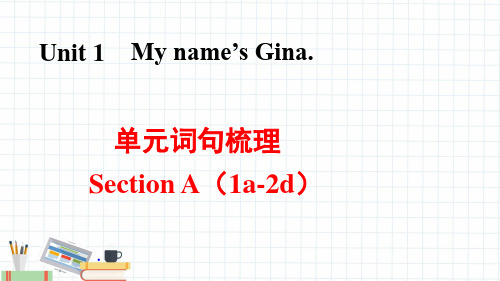
Unit 1 My name’s Gina.
单元词句梳理 Section B(3a-Self Check)
.
必背单词
1. middle adj.中间的 n.中间 →__in__th_e__m__id_d_l_e_o_f_.._._在……中间 _m_i_d_d_l_e_s_c_h_o_o_l 中学
】 6.your pron.你的;你们的
必背单词
7.Ms.(用于女子的姓氏或姓名前,不指明婚否)女士 →_M__s_._B_r_o_w__n_布朗女士(不强调婚否);_M__is_s_G__r_e_e_n_格 林小姐(未婚);_M__r_._B_l_a_c_k_ 布莱克先生;_M__rs_._B__la_c_k__ 布莱克夫人
Unit 1 My name’s Gina.
单元词句梳理 Section B(2a-2c)
.
必背单词
1.first adj.第一 st adj.最后的;末尾的→_la_s_t_n_a_m__e姓→___at__la_s_t__最后 3.friend n.朋友→_f_r_ie_n_d_l_y_adj.友好的→_m__a_k_e_f_r_ie_n_d_s_交朋
友→be_f_r_ie_n_d_l_y_t_o___对……友好 4.China 中国→ _in__e_ 中国人;汉语
→___c_h_in_a___瓷器
必背句子
5.__W__h_a_t’_s_ your___fi_r_s_t_n_a_m__e__ ? 你的名字是什么? 6. _W__h_a_t_’s__your _la_s_t_n_a_m_e_? 你的姓是什么? 7. _M__y_f_r_i_en__d_i_s_i_n_China. 我的朋友在中国。
七年级上册英语Unit1知识点归纳总结
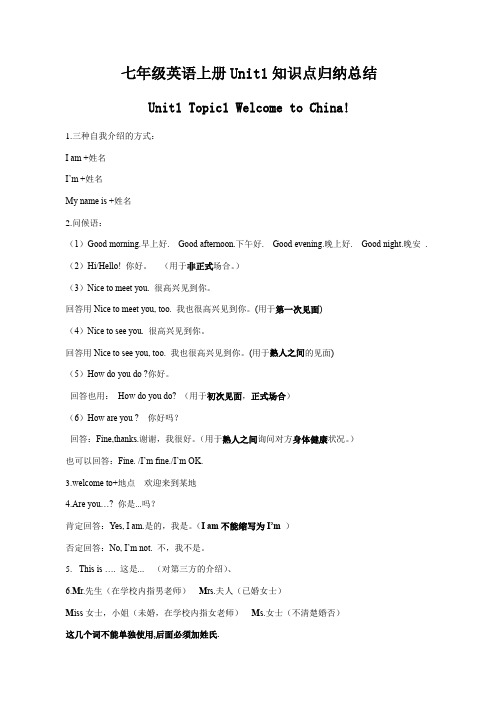
七年级英语上册Unit1知识点归纳总结Unit1 Topic1 Welcome to China!1.三种自我介绍的方式:I am +姓名I’m +姓名My name is +姓名2.问候语:(1)Good morning.早上好. Good afternoon.下午好. Good evening.晚上好. Good night.晚安. (2)Hi/Hello! 你好。
(用于非正式场合。
)(3)Nice to meet you. 很高兴见到你。
回答用Nice to meet you, too. 我也很高兴见到你。
(用于第一次见面)(4)Nice to see you. 很高兴见到你。
回答用Nice to see you, too. 我也很高兴见到你。
(用于熟人之间的见面)(5)How do you do ?你好。
回答也用:How do you do? (用于初次见面,正式场合)(6)How are you ? 你好吗?回答:Fine,thanks.谢谢,我很好。
(用于熟人之间询问对方身体健康状况。
)也可以回答:Fine. /I’m fine./I’m OK.3.welcome to+地点欢迎来到某地4.Are you…? 你是...吗?肯定回答:Yes, I am.是的,我是。
(I am不能缩写为I’m)否定回答:No, I’m not. 不,我不是。
5.This is …. 这是... (对第三方的介绍)、6.M r.先生(在学校内指男老师)M rs.夫人(已婚女士)M iss女士,小姐(未婚,在学校内指女老师)M s.女士(不清楚婚否)这几个词不能单独使用,后面必须加姓氏.7.再见的几种表达方式:Goodbye或Bye或Bye-bye。
还有几种再见的说法:See you later.一会儿见. See you.再见。
8.be动词am is are 的用法:I(我)用am,you(你)用are,is连着he(他)she(她)it(它),单数用is,复数用are.Unit1 Topic 2 Where are you from?一.重点词组1.Excuse me 对不起,原谅,请问,打搅2.be from…= come from…来自…… ,是…… 人 card 名片4. telephone number /phone number 电话号码5. Thank you very much.非常感谢6.That’s OK. 不用谢7.family name 姓given name 名二.重点句型1.---Excuse me, are you Jane ? 对不起,请问你是简吗?---Yes ,I am . 是的,我是。
人教版七年级上册英语unit1知识要点

Unit 1 My new classmates 知识要点一、单词1. meet:v.相遇,见面2. friend:n.朋友3. our:pron.我们的4. classmate:n.同学5. this:adj.pron.这;这个6. those:pron.那些7. look:v.看8. new:adj.新的9. good:adj.好的10. boy:n.男孩11. girl:n.女孩12. from:prep.从……来13. America:n.美国14. China:n.我国15. Japan:n.日本16. Korea:n.韩国17. England:n.英格兰18. Russia:n.俄罗斯19. Th本人land:n.泰国20. France:n.法国21. Australia:n.澳大利亚二、重点句型1. Nice to meet you.:很高兴见到你。
2. Are they from China?:他们来自我国吗?3. Where is he from?:他来自哪儿?4. Look at the new student.:看看这位新同学。
三、语法1. 形容词的最高级形容词比较级+than+其他成分如:Tom is taller than Mike.特殊形容词:good-better-best,bad-worse-worst,much/many-more-most,little-less-least2. 人称代词的对象形式主格:I,you,he,she,it,we,they宾格:me,you,him,her,it,us,them如:This is my friend. I like him.3. 介词from的用法用来表示人或事物所从属的国家或地点如:He is from China. She is from Japan.四、交际用语1. 自我介绍Hello, I’m Mary. Nice to meet you.2. 询问他人来自何处Where are you from?3. 介绍他人身份This is my friend, John. He is from England.4. 与他人交谈Look at the new student. He is from Australia.以上就是人教版七年级上册英语unit1的知识要点,通过学习这些内容,相信同学们可以更好地掌握本单元的知识,轻松应对课堂教学和课后作业。
部编版五年级上册英语第一单元知识总结-Unit 1知识总结
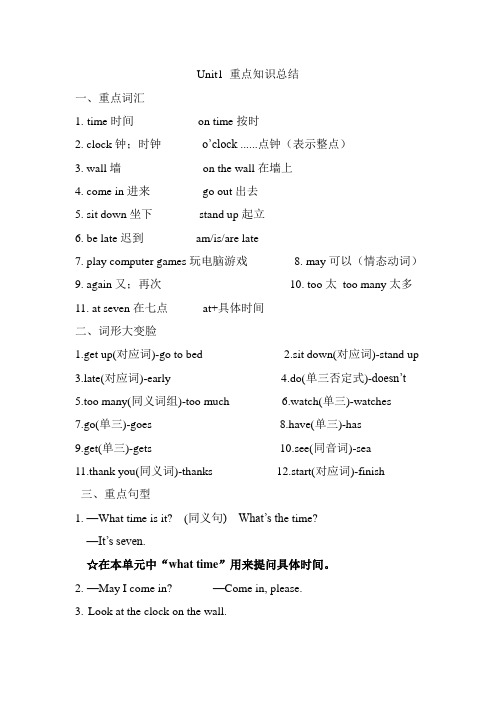
Unit1 重点知识总结一、重点词汇1.time时间on time按时2. clock钟;时钟o’clock ......点钟(表示整点)3. wall墙on the wall在墙上4. come in进来go out出去5. sit down坐下stand up起立6. be late迟到am/is/are late7. play computer games玩电脑游戏8. may可以(情态动词)9. again又;再次10. too太too many太多11. at seven在七点at+具体时间二、词形大变脸1.get up(对应词)-go to bed2.sit down(对应词)-stand upte(对应词)-early4.do(单三否定式)-doesn’t5.too many(同义词组)-too much6.watch(单三)-watches7.go(单三)-goes 8.have(单三)-has9.get(单三)-gets 10.see(同音词)-sea11.thank you(同义词)-thanks 12.start(对应词)-finish三、重点句型1. —What time is it? (同义句) What’s th e time?—It’s seven.☆在本单元中“what time”用来提问具体时间。
2.—May I come in? —Come in, please.3.Look at the clock on the wall.4.—I’m sorry.—That’s all right.5.You are late again.6.—What time do you get up?—I get up at seven in the morning.7.—What time does your mother go to bed?—She goes to bed at nine fifteen in the evening.8.Don’t play too many computer games and go to bed early.9.—Sit down, please. —Thank you.10.—What do you do at twelve?—I have lunch at twelve.四、句型转换1.It’s seven o'clock.(划线部分提问)☆思路:由于划线部分是“时间”,因此用“what time”提问。
Unit1-单词短语句型总结-2020-2021学年高一下学期英语人教版(2019)必修二

新人教版必修二unit1单词短语句型总结核心单词1. heritage n遗产(指国家或社会长期形成的历史、传统和特色)2. relic n.遗物;遗迹3. former adj.以前的;(两者中)前者的4. clue n.线索;提示5.preserve vt.保存;保护;维持n.保护区6. protest n.抗议vi.&..(公开)反对;抗议7. committee.委员会8. establish vt.建立;创立9. loss n.丧失;损失10. within prep.adv.在(某段时间、距离或范围)之内11. issue n重要议题;争论的问题vt.宣布;公布12. document n.文件;公文;(计算机)文档记录;记载(详情)13. attempt n. &vt.企图;试图;尝试14. worthwhile adj.值得做的;值得花时间的15. download vt.下载n.下载;已下载的数据资料司16. process. 过程;进程;步骤vt.处理;加工17. overseas adj.海外的adv.在海外18. exit n.出口;通道vi. &vt.出去;离去19. parade n.游行;检阅举行庆祝;游行示威20. forgive vt.&.vi.原谅;宽恕vt.对不起;请原谅21. digital adj.数码的;数字显示的22. image n.形象;印象23. throughout prep.各处;遍及;自始至终24. quality.质量;品质;素质;特征25. opinion n.意见;想法;看法26. quote vt.引用27. paraphrase vi&vt.(用更容易理解的文字)解释28. forever adv.永远;长久地拓展单词1.creative adj.创造性的;有创造力的;有创意的→ creatively adv.创造性地;有创造力地→ create.创造2.promote vt.促进;提升;推销;晋级→ promotion.提升,晋升3 application.申请(表);用途;运用;应用(程序)→apply.应用;涉及;申请→applicant.申请人;求职者4. balance.平衡;均匀vt.使平衡→ balanced adj.平衡的,均衡的5. proposal.提议;建议→propose vt.提议;建议6. likely adj.可能的adv.可能地→ unlikely adj.不(太)可能的adv.不(太)可能地7. limit.限度;限制vt.限制;限定→limited adj.有限的→limitation.范围;限制重8. prevent阻止;阻碍;阻挠→ prevention.预防;防止9. contribute vi.&vt.捐献;捐助→ contribution.捐款;贡献;捐赠10. investigate vi.&vt.调查;研究→ investigation.调查11. conduct.行为;举止;管理方法vt.组织;安排;带领→ conductor.(公车)售票员;列车员;(乐队)指挥拓12. donate.(尤指向慈善机构)捐赠;赠送;献(血)→ donation.捐赠→ donator.捐赠者13. disappear vi.消失;灭绝;消亡→ appear vi.出现14. professional adj.专业的;职业的n.专业人员;职业选手→ profession.行业,职业15. entrance.入口;进入→ enter vi.&vt.进入16. tradition.传统;传统的信仰或风俗→ traditional adj传统的17. historic adj.历史上著名(或重要)的;有史时期的→ history.历史18. comparison.比较;相比→ compare vt.比较;对比19 . identify vt.确认;认出;找到→ identification.身份证明重点短语1. take part in参与(某事);参加(某活动)2. give way to让步;屈服3. keep balance保持平衡4. lead to,导致5. make a proposal提出建议6. turn to向……求助7.prevent. . from ..阻止;不准8. donate... to ..向……捐赠…9. make sure确保;设法保证10. all over the world在世界各地11. tell right from wrong明辨是非12. work on从事13. take photos拍照14 . raise money募捐;筹款15. be proud of以……而自豪16. be familiar with一熟悉经典句式1.There comes time when表示……的时代已经到来;是时候……” There comes a time when the old must give way to the new, and it is not possible to preserve everything from our past as we move towards the future.2. not only. but also..表示“不但……而且……”用于连接两个并列结构。
八年级上册英语unit1知识点总结

八年级上册英语unit1知识点总结在八年级上册英语课程中,unit1是一个比较重要的单元,其中包括了很多基础知识点。
为了帮助同学们更好地掌握这些知识,下面对unit1的知识点进行了总结。
一、单词和短语1. greet:问候2. introduce:介绍3. cellphone:手机4. lunch:午饭5. have a good time:玩得愉快6. in two days:两天后7. wish:祝福8. come true:实现二、语法1. 一般现在时的用法:表示现在的状态、经常性或习惯性的行为。
例如:He is a teacher.(他是一名教师。
)I always get up at six in the morning.(我总是早上六点起床。
)2. 名词所有格的用法:表示所属关系。
例如:John’s book(约翰的书)3. 直接引语和间接引语的用法:直接引语用引号括起来,间接引语不用引号。
例如:直接引语:He said,“I’m from China.”(他说:“我来自中国。
”)间接引语:He said that he was from China.(他说他来自中国。
)4. 祈使句的用法:表示请求、命令、劝告等。
例如:Please come here.(请过来。
)Don’t shout.(别喊了。
)5. 物主代词的用法:表示所属关系,分为形容词性物主代词和名词性物主代词。
例如:形容词性物主代词:my、your、his、her、its、our、your、their名词性物主代词:mine、yours、his、hers、its、ours、yours、theirs三、句型1. What do you think of…?:你认为……怎么样?例如:What do you think of this movie?(你认为这部电影怎么样?)2. How do you spell…?:你怎么拼写……?例如:How do you spell your name?(你的名字怎么拼写?)3. Would you like…?:你想要……吗?例如:Would you like some tea?(你想要一些茶吗?)4. Can/Could you do me a favor…?:你能帮我一个忙吗?例如:Can/Could you do me a favor and lend me your pen?(你能借给我你的笔吗?)5. It’s + 形容词 + (for sb.) + to do sth.:……对(某人)来说是做某事的。
五年级英语上册Unit 1知识学习总结要点总汇(新起点)
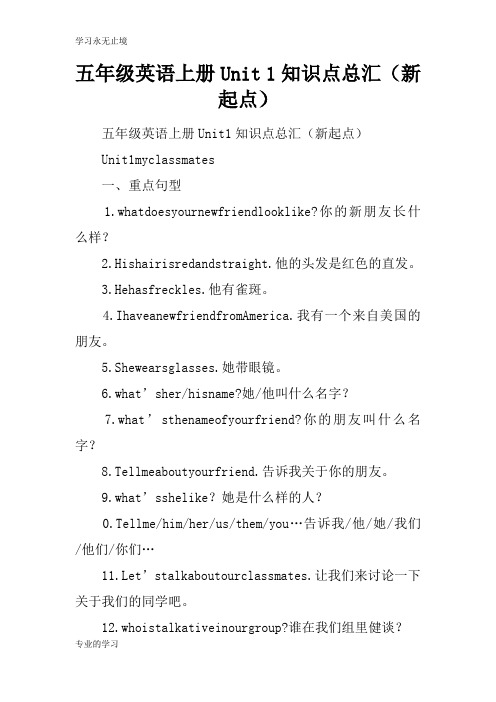
五年级英语上册Unit 1知识点总汇(新起点)五年级英语上册Unit1知识点总汇(新起点)Unit1myclassmates一、重点句型1.whatdoesyournewfriendlooklike?你的新朋友长什么样?2.Hishairisredandstraight.他的头发是红色的直发。
3.Hehasfreckles.他有雀斑。
4.IhaveanewfriendfromAmerica.我有一个来自美国的朋友。
5.Shewearsglasses.她带眼镜。
6.what’sher/hisname?她/他叫什么名字?7.what’sthenameofyourfriend?你的朋友叫什么名字?8.Tellmeaboutyourfriend.告诉我关于你的朋友。
9.what’sshelike?她是什么样的人?0.Tellme/him/her/us/them/you…告诉我/他/她/我们/他们/你们…11.Let’stalkaboutourclassmates.让我们来讨论一下关于我们的同学吧。
12.whoistalkativeinourgroup?谁在我们组里健谈?13.Sheisgoodatmath.她擅长数学。
14.Heisgoodatfishing.他擅长钓鱼。
15.Hedoesn’tlikehomework.他不喜欢家庭作业。
16.HelikeswatchingTV.他喜欢看电视。
17.Hishobbyisplayingoncomputers.他的爱好是在电脑上玩。
18.what’sheorshelike?他或者她是什么样的人?19.Timsays“Goodmorning”totheteacher.Heopensthedoorforher.蒂姆对老师说“早上好”。
他为她开门。
20.Shefindsawalletinthehall.Ithasalotofmoneyinit.Sh etakesthewallettotheoffice.她在走廊里发现一个钱包。
